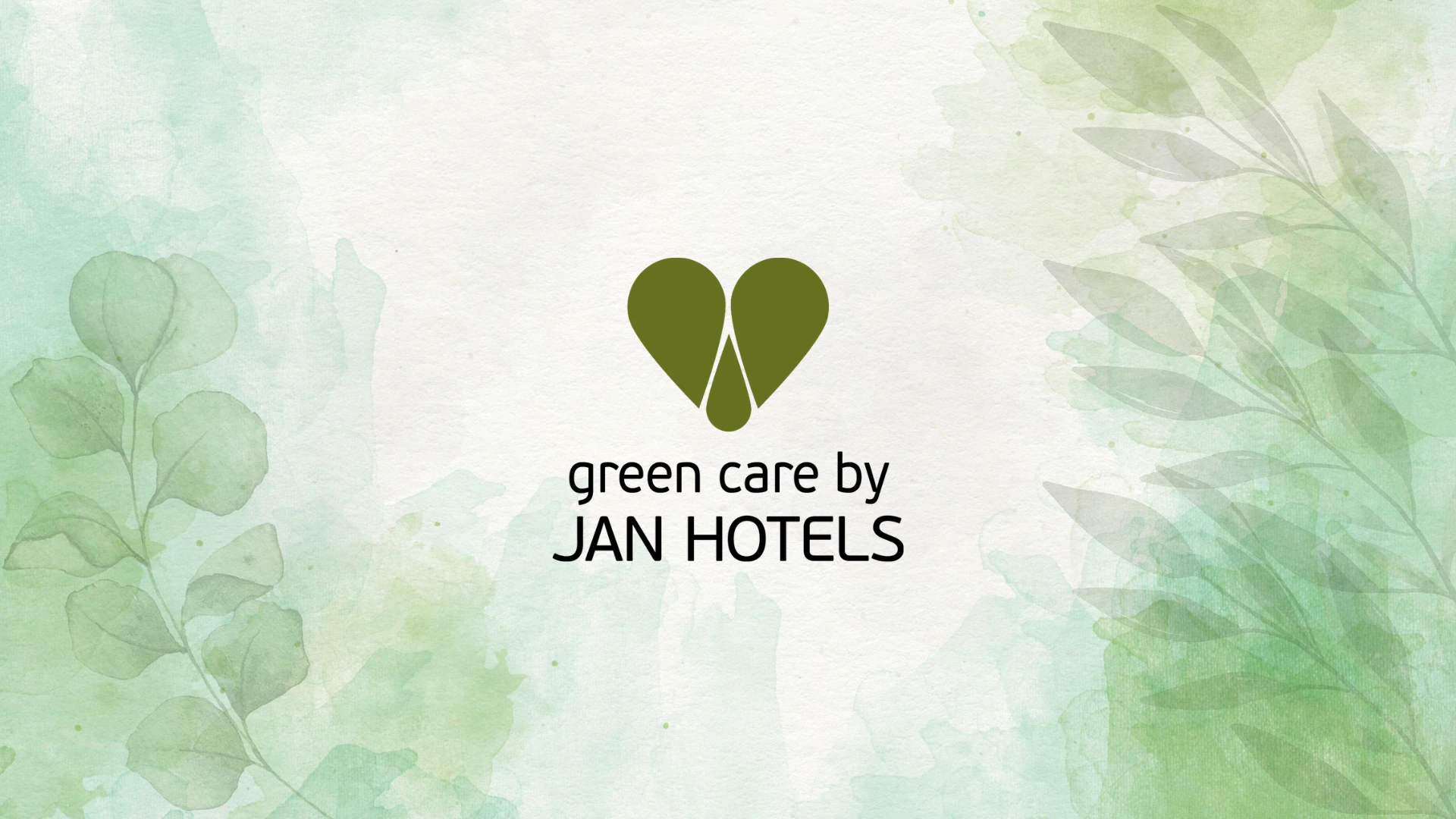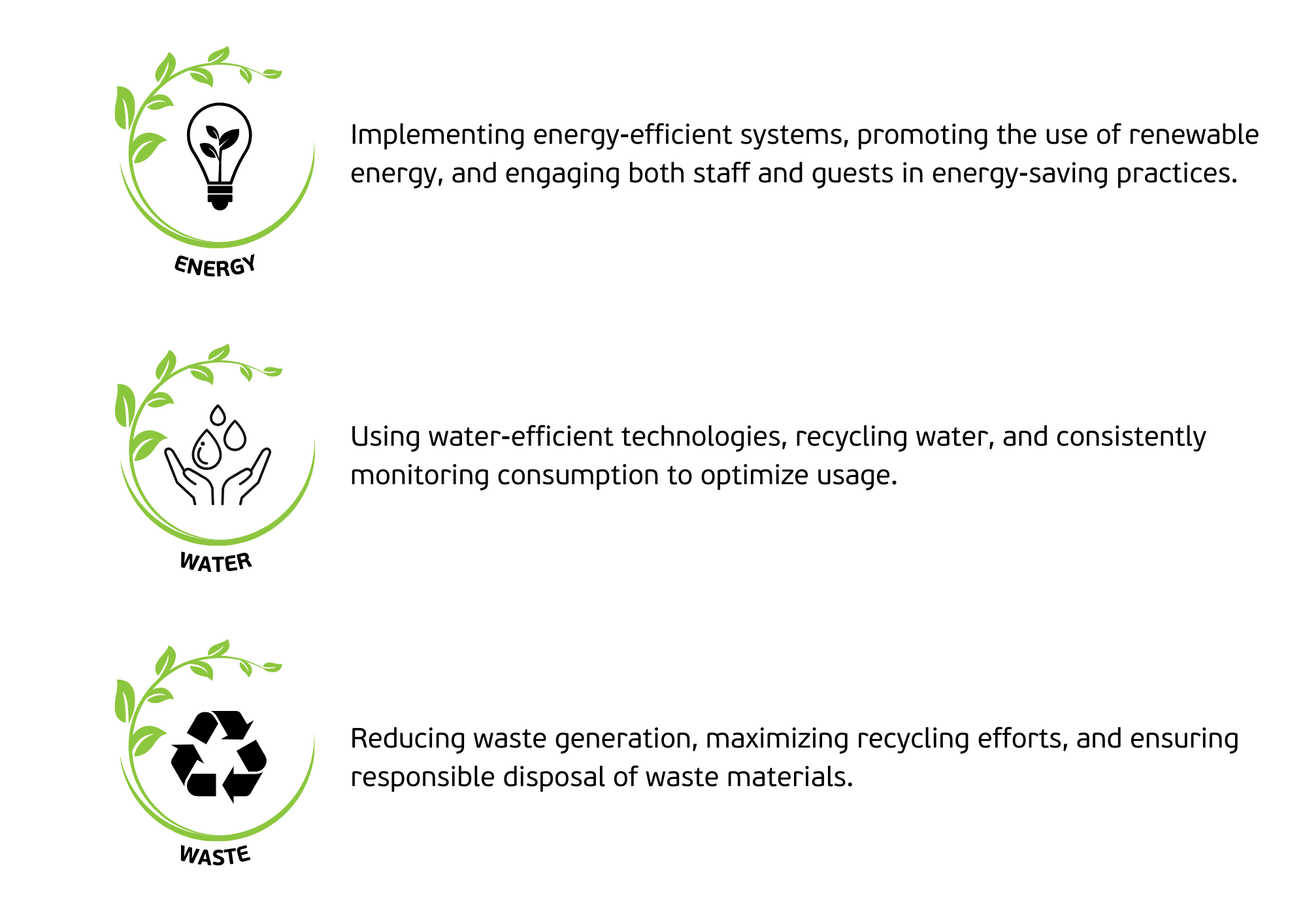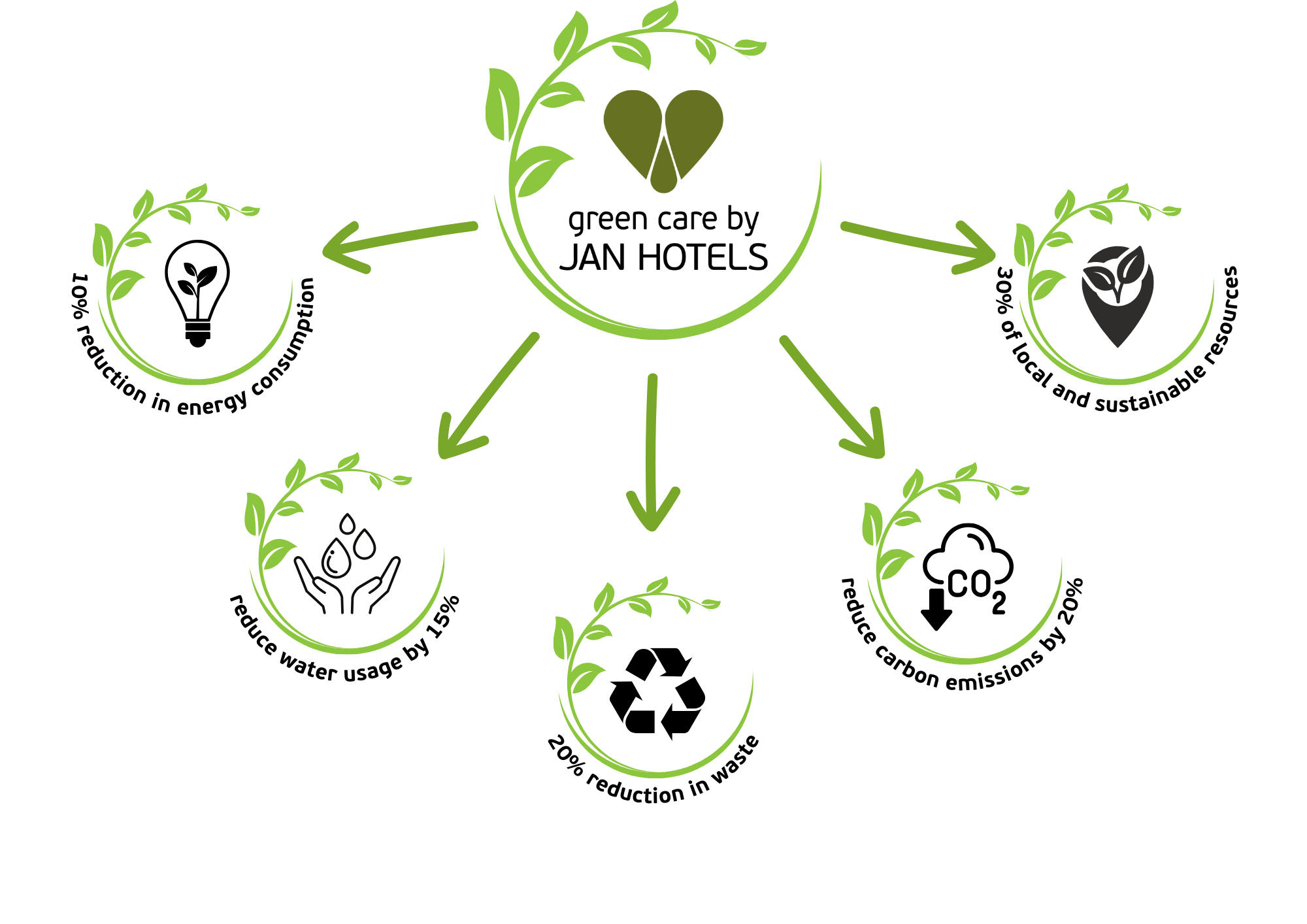
JAN HOTELS Environmental Management Policy
At JAN HOTELS we care about environmental protection and sustainability. We are constantly looking for new ways to minimize our ecological footprint and implement measures that contribute to the protection of our planet. That's why we present our environmental management policy.
1. Environmental Policy Overview
JAN HOTELS is committed to reducing its environmental footprint through responsible management of energy, water, and waste across all properties. This policy reflects our dedication to sustainability and outlines our objectives to continuously enhance the environmental performance of our operations.
2. Energy, Water, and Waste Management
At JAN HOTELS, we care for the environment through smart, efficient solutions that reduce our ecological footprint while enhancing guest comfort.
JAN HOTELS focuses on three critical areas:
Energy Efficiency
- Most of our hotels use key card-controlled lighting, ensuring lights switch off automatically when guests leave the room.
- Hotels equipped with a Building Management System automatically optimise heating and cooling, especially when windows are open or rooms are unoccupied.
- Empty rooms are set to an energy-saving temperature to avoid unnecessary consumption.
Water Conservation
- We carry out regular leak checks and address any issues immediately.
- Bed linen is changed after every 3 nights, and towels only upon request (when placed on the bathroom floor). This policy helps save water, energy, and detergents.
Waste Reduction
- All hotels separate waste and actively reduce single-use plastics.
- Used cooking oils and fats are collected exclusively by certified waste companies — never discharged into wastewater.
- Organic waste is also handled responsibly through specialised partners.
3. Action Program & Objectives
We set clear, measurable goals aimed at reducing the environmental impact of our operations, focusing on energy consumption, water use, and waste management. These objectives are updated every two years in line with internal performance goals and EU Ecolabel standards. Where applicable, these goals are aligned with the best practices outlined in environmental performance indicators.
4. Internal Assessment & Continuous Improvement
JAN HOTELS conducts annual reviews of its environmental practices to ensure objectives are being met. This review process includes identifying areas for improvement and taking corrective actions where necessary. The goal is to continuously improve and adapt our sustainability initiatives.
5. Compliance with Laws, Regulations, and Voluntary Standards
JAN HOTELS complies with all local and international laws and regulations related to environmental management. Additionally, the hotel ensures adherence to voluntary environmental standards, seeking to exceed compliance where possible by adopting advanced international best practices.
6. Energy and Environmental Data Management
JAN HOTELS will utilize a comprehensive system to monitor, manage, and reduce environmental impact. This includes tracking data on energy use, carbon emissions, water consumption, and waste production. These data will guide the setting of annual performance objectives, and regular audits will ensure accuracy and transparency.
7. Innovative Solutions and Sustainable Design
JAN HOTELS is committed to exploring and adopting innovative solutions to reduce dependency on natural resources. This includes integrating energy-efficient designs and systems into both new developments and renovations, ensuring long-term sustainability.
8. Water Stewardship
Managing water resources efficiently is a priority for JAN HOTELS. This includes reducing water consumption, recycling water where possible, and investing in technologies that promote water conservation.
9. Waste Management
JAN HOTELS aims to minimize waste production and maximize recycling efforts. This includes reducing plastic, food, and packaging waste while ensuring the proper handling and disposal of hazardous materials.
10. Sustainable Sourcing
Environmental sustainability is integrated into JAN HOTELS’ purchasing decisions, prioritizing local and resource-efficient products and services. The company is committed to supporting sustainable food sourcing and reducing the environmental impact of its supply chain.
11. Stakeholder Engagement
JAN HOTELS engages employees, guests, and business partners in environmental stewardship. This involves raising awareness about the importance of sustainability, providing training for staff, and encouraging guests to participate in environmentally friendly practices.
12. Reporting and Transparency
JAN HOTELS is dedicated to reporting its environmental objectives and progress transparently to stakeholders. This includes an annual report of environmental performance to management and periodic updates to external stakeholders.
JAN HOTELS Environmental Action Program & Objectives
JAN HOTELS is committed to continually improving its environmental performance, guided by the following actionable goals and objectives. This program outlines the steps that will be taken to achieve sustainability in energy, water, and waste management across all properties.

The action plan will be reviewed and updated every two years to ensure progress and alignment with evolving industry standards and environmental goals.
1. Energy Management Objectives
Goal: Achieve a 10% reduction in energy consumption across all properties within two years.
Actions:
- Upgrade to energy-efficient lighting and appliances across all hotel facilities, ensuring at least 80% of lighting is energy-efficient (A-rated).
- Install motion-sensor lighting in public spaces and guest areas to reduce unnecessary energy use.
- Promote the use of renewable energy sources where feasible, with a goal of sourcing 50% of total energy needs from renewable sources by the end of the two-year period.
- Conduct regular staff training programs on energy-saving practices.
- Introduce guest awareness initiatives that encourage responsible energy consumption during their stay.
2. Water Management Objectives
Goal: Reduce water usage by 15% across all properties within two years.
Actions:
- Install low-flow faucets, showerheads, and dual-flush toilets to minimize water usage.
- Implement water recycling systems for greywater use in non-potable applications like irrigation and cooling.
- Regularly monitor and audit water usage across all properties, setting monthly water consumption targets.
- Encourage guests to participate in water conservation efforts by offering them the option to reuse towels and bed linens instead of daily laundering.
- Implement innovative water management solutions, particularly in high water-risk areas.
3. Waste Management Objectives
Goal: Achieve a 20% reduction in waste sent to landfills within two years.
Actions:
- Implement a comprehensive waste sorting and recycling program across all properties, with designated bins for different types of waste (e.g., organic, recyclables, hazardous).
- Work with suppliers to reduce packaging waste by prioritizing bulk purchasing and recyclable or biodegradable packaging materials.
- Reduce food waste by introducing portion control practices in hotel restaurants and promoting the use of local, seasonal produce.
- Partner with local waste management and recycling services to ensure that at least 50% of waste is diverted from landfills.
- Introduce composting for organic waste at all properties.
4. Carbon Emission Reduction Objectives
Goal: Reduce carbon emissions by 20% over the next five years.
Actions:
- Conduct a carbon footprint assessment for each property to establish baseline emissions.
- Increase the use of electric or hybrid vehicles.
- Enhance insulation and implement smart heating and cooling systems to reduce energy loss.
- Offset carbon emissions by supporting local reforestation or clean energy projects.
- Regularly track and report greenhouse gas emissions to identify areas for improvement.
5. Sustainable Sourcing and Local Engagement Objectives
Goal: Ensure that 30% of all food and beverage offerings are sourced from local suppliers or are certified sustainable.
Actions:
- Prioritize local and seasonal products in hotel menus, supporting local farmers and reducing transportation emissions.
- Work with suppliers who comply with environmental sustainability certifications (such as Fairtrade, Organic, or EU Ecolabel).
- Engage local communities in environmental initiatives, including clean-up projects or conservation efforts.
- Train staff on sustainable procurement practices and include sustainability as a key consideration in supplier selection.
6. Employee and Guest Engagement Objectives
Goal: Foster a culture of sustainability among staff and guests.
Actions:
- Provide regular training for all employees on environmental management practices, including energy, water, and waste reduction.
- Offer incentives and recognition programs for employees who contribute innovative ideas for reducing the environmental impact of operations.
- Encourage guest participation in sustainability programs by offering eco-friendly options, such as digital receipts or opting out of daily housekeeping.
- Display educational materials in common areas to raise awareness of the hotel’s environmental efforts and encourage guest involvement.
7. Annual Review and Continuous Improvement
Goal: Ensure that all objectives are being exceeded by conducting an annual internal environmental review.
Actions:
- Perform regular audits of environmental performance indicators such as energy and water usage, waste generation, and carbon emissions.
- Review progress toward objectives every 12 months and update the action plan to reflect new goals or challenges.
- Implement corrective actions where performance falls short of objectives, ensuring continuous improvement.



